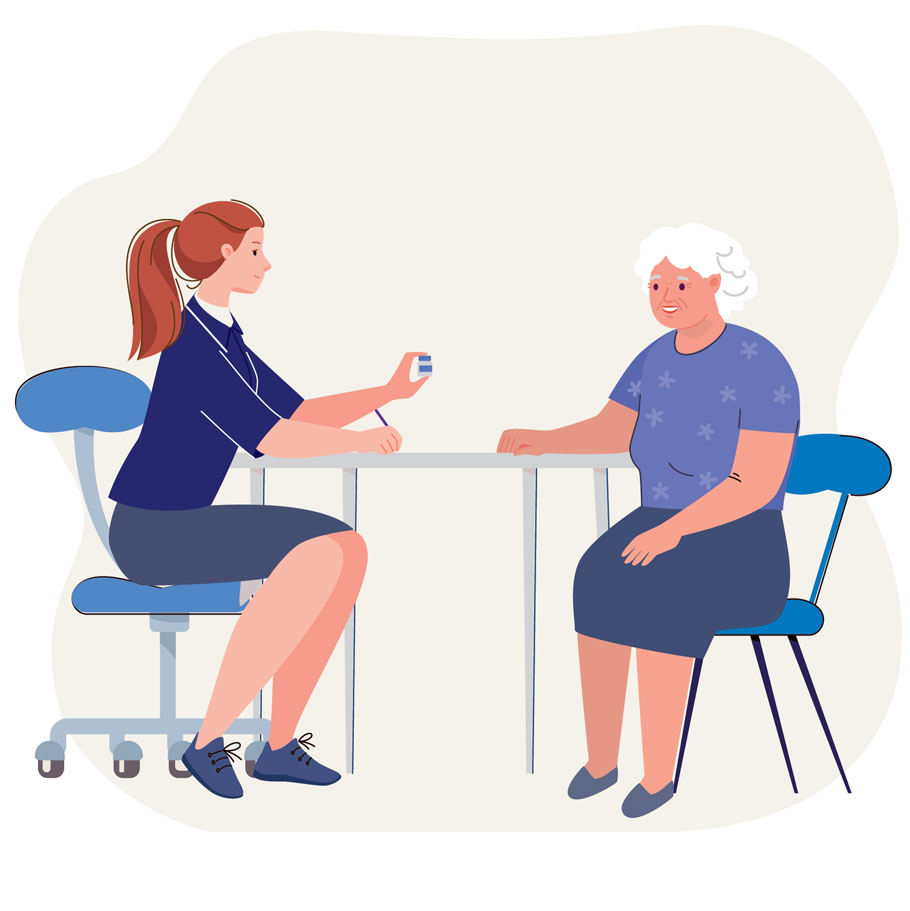- Home
- Respite Care
- Respite Information & Support
- What Happens When a Carer Gets Burnt Out?
What Happens When a Carer Gets Burnt Out?
Signs a carer needs a break | What to do if a carer reaches their limit | Organisations to contact for help
Posted 3rd August 2023 | 6 minute read
Written by Jesse Gramenz Reviewed by Julie Dymock
Reviewed by Julie Dymock

As a carer, it's easy to put aside how you're feeling. The reality is that if you're not looking after yourself that's not good for anyone. So, let's talk about what it looks like when a carer reaches their limit and how you can best manage it.
When a carer reaches their limit looking after a loved one, it can feel completely overwhelming:
You can feel like you’re not helping or doing anything right
You’re not having any time for yourself or the things you enjoy
Your social life can feel non-existent
You’re doing everything around the house, around the clock
You feel like you’re properly burnt out on life and on caring
When you’re going through all, or any, of these, it can feel like there are no options, no support and that there is no one there to help. But the reality is, that couldn’t be further from the truth.
With the right preparation and supports in place, you can have a chance to take a break, recover and rebound.
Carer stress is like a rubber band
Without regular breaks, a carer’s limit is like a rubber band. Slowly it stretches until eventually and completely unexpectedly, it snaps.
"I told them I wasn't coping.' Cathy was caring for both of her parents before she reached her limit.
‘You try and put on a brave face, but with Mum, I still had two kids at home while I was working. It was pretty much, we need to get help, or I'm going to have to get help for me."
“You feel like you've failed. You feel like you should be able to do it all."
"It is a hard decision to make. It's a reality call of how sick or elderly they are. You have to come to terms with that part of it too."
7 Signs a Carer Might Need a Break
While being a carer, there are high points, and there are tough times. And sometimes, those tough times start to outweigh the good. That's when it's important to realize that it's okay to need a break.

Here are a seven signs that a carer might need a break:
1. Feeling overwhelmed or constantly worried: If you find yourself constantly anxious, stressed, or overwhelmed, it's a strong indication that you need some time off. Chronic stress can lead to a host of physical and mental health problems.
2. Feeling tired even after resting: If you're feeling fatigued or lacking energy even after a good night's sleep, it may be due to the constant demands of caregiving.
3. Falling ill regularly: High levels of stress from caring has the potential to take a toll on your immune system which can cause you to fall ill more often
4. Getting easily irritated or angry: Feeling irritated or short-tempered more than usual, particularly towards the person you're caring for, is another sign that you're reaching your limit.
5. Having trouble sleeping or eating: Changes in sleep patterns or appetite, especially if accompanied by weight loss or gain, can be signs of stress and burnout.
6. Feeling hopeless or depressed: Feelings of despair or recurring thoughts of death or suicide are serious signs of caregiver burnout and require immediate professional attention.
7. Neglecting your own needs because you're too busy or don't care anymore: If you're neglecting your own health or personal needs, it's a clear sign you're overextended and need a break.
Remember: Taking care of yourself isn't just good for you—it's also good for the person you're caring for. A healthy, well-rested caregiver is able to provide better care, which ultimately benefits everyone involved.
Acknowledge the Burnout: The first step is to recognize the signs of caregiver burnout - such as feeling overwhelmed, constantly fatigued, experiencing changes in sleep or appetite, losing interest in activities you once enjoyed, or feeling irritable, anxious, or depressed.
Share How You’re Feeling: Find someone you trust to talk about how you are feeling. It could be a friend, family member, or even a counselor.
Consult with Healthcare Professionals: Share your experiences and challenges with professionals involved in the care of the person you're looking after. They may be able to suggest solutions or alternatives that you haven't considered.
Reach Out to Aged Care Professionals: Contact professionals in the aged care sector who have experience in these matters. They can provide guidance and resources to support you and alleviate some of your caregiving responsibilities. We’ve provided a list below of some key organisations in Australia you can contact.
Consider Respite Care: Consider short-term, temporary relief for yourself if you need it. Respite care can be provided in the home, in a aged care facility, or in the community.
Look into in-Home Care: By getting home care support and a home care package for your loved ones, you can get help with anything from cleaning, to nursing support or even help with maintaining the yard. You can check My Aged Care to see if you're eligible for an assessment for this type of support.

1. My Aged Care
How they can help: My Aged Care is the starting point for accessing aged care services in Australia. They provide information on aged care for caregivers and the elderly, and manage assessments for home support and aged care homes.
Financial assistance: Depending on the outcome of the ACAT assessment, your loved one may be eligible for government subsidised in-home care or residential aged care.
Contact details: Call them on 1800 200 422 or visit their website www.myagedcare.gov.au
2. Carer Gateway
How they can help: This is a national service funded by the Australian government to provide reliable services and advice for carers. They offer counselling, peer support, coaching, and educational resources.
Financial assistance: While Carer Gateway does not directly provide financial aid, they can help you understand what financial help you could be eligible for and guide you through the process of applying.
Contact details: Call them on 1800 422 737 or visit their website www.carergateway.gov.au
3. Carers Australia
How they can help: This national body represents carers across Australia. They offer counselling, education, training, and carer-friendly services and policies.
Financial assistance: They do not offer direct financial assistance but can guide you towards appropriate resources.
Contact details: Call them on (02) 6122 9900 or visit their website www.carersaustralia.com.au
4. Department of Human Services (Services Australia)
How they can help: They manage payments and services to support those who provide care to someone in need.
Financial assistance:
Carer Payment: For individuals who provide constant care. As of June 2023, the maximum basic rate for a single person is $868.30 per fortnight.
Carer Allowance: A supplementary payment for carers. As of June 2023, it is $131.90 per fortnight.
Carer Supplement: An annual lump sum payment of $600, designed to assist with the costs of caring.
Contact details: Visit their website at www.servicesaustralia.gov.au
5. Commonwealth Respite and Carelink Centres
How they can help: These centres provide information about respite services in your local area and short-term emergency respite.
Financial assistance: They don't provide financial aid directly but can guide you to appropriate services. They also arrange respite care which can be subsidised.
Contact details: Call them on 1800 052 222 during business hours, or on 1800 059 059 for emergency respite support outside standard business hours.
Parting thoughts
Being a carer is one of the most rewarding but difficult jobs in the world. If you feel like you’ve reached your limit as a carer, it’s important to know that you’re not alone and that this is a job that shouldn’t be done alone.
Find people you trust, get help from organisations that are made to help you, take a break if you need it and find balance in life as a carer.